We’ve launched a new blog at the link below – head there for the latest:
Saudi Arabia to partially lift suspension of international flights – as it happened
More than 307,000 cases in 24 hours to Sunday; Israel imposes second national lockdown; Cases hit daily record in Czech Republic. This blog is closed
Sun 13 Sep 2020 18.55 EDT
First published on Sat 12 Sep 2020 18.49 EDT- Summary
- World Health Organization reports record single-day rise in global infections
- Israel to impose new three-week nationwide lockdown
- Summary
- Austria 'experiencing start of second wave'
- Record increase in cases in Czech Republic
- Protesters in Melbourne throw fruit at police
- Victorian parliament shut down after security guard tests positive
- Victorian police charge woman who was dragged from her car
- New Zealand reports two new cases
- One person arrested at Melbourne anti-lockdown protest
- Three cases of Covid confirmed in Syria's largest refugee camp
- Brett Sutton say rolling day average in Melbourne down to 56.9
- Queensland doctors defend closed borders, tell critics to 'back off'
- NSW records nine new cases, four in hotel quarantine
- Melbourne's new rules start from midnight
- Regional Victoria records no new cases
- Victorian premier, Daniel Andrews, confirms 41 new cases, 7 deaths
- Mexico records 5,674 new cases
- Australians spending less – but more going on home cooking and booze
- Vaccine can conquer virus, says Australian minister
- Victoria's roadmap out of lockdown
- Victoria records 41 new cases and seven more deaths
- Victoria records 41 new cases and seven deaths
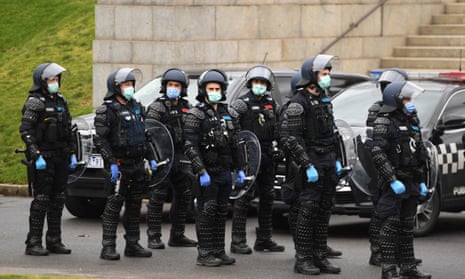
Live feed
- Summary
- World Health Organization reports record single-day rise in global infections
- Israel to impose new three-week nationwide lockdown
- Summary
- Austria 'experiencing start of second wave'
- Record increase in cases in Czech Republic
- Protesters in Melbourne throw fruit at police
- Victorian parliament shut down after security guard tests positive
- Victorian police charge woman who was dragged from her car
- New Zealand reports two new cases
- One person arrested at Melbourne anti-lockdown protest
- Three cases of Covid confirmed in Syria's largest refugee camp
- Brett Sutton say rolling day average in Melbourne down to 56.9
- Queensland doctors defend closed borders, tell critics to 'back off'
- NSW records nine new cases, four in hotel quarantine
- Melbourne's new rules start from midnight
- Regional Victoria records no new cases
- Victorian premier, Daniel Andrews, confirms 41 new cases, 7 deaths
- Mexico records 5,674 new cases
- Australians spending less – but more going on home cooking and booze
- Vaccine can conquer virus, says Australian minister
- Victoria's roadmap out of lockdown
- Victoria records 41 new cases and seven more deaths
- Victoria records 41 new cases and seven deaths

The UK government’s coronavirus testing programme is dealing with a backlog of 185,000 swabs, with tests being sent to Italy and Germany as local labs are overwhelmed.
Not even a week after the government was forced to apologise for continuing delays to Covid testing, the Department of Health and Social Care insisted on Sunday that the capacity of the NHS test-and-trace system was the highest it had ever been but there was a “significant” demand for tests.
This includes demand from people “who do not have symptoms and are not otherwise eligible”, the DHSC said.
Leaked documents revealed the 185,000 backlog and the fact that tests are being sent to German and Italian laboratories for processing, according to the Sunday Times:

We meet again.
Helen Sullivan here, taking over the blog. Get in touch on Twitter @helenrsullivan or via email: helen.sullivan@theguardian.com.
Summary

Here are the latest key developments at a glance:
- The World Health Organization has reported a record single-day increase in global coronavirus cases on Sunday, as the tally surged by a further 307,930 infections in just 24 hours.
- Israel’s government will impose a new three-week nationwide lockdown that will start on Friday, after the rate of infection during the past two weeks became the highest recorded since the outbreak began.
- South Africa’s finance minister, Tito Mboweni, warned Sunday the economy could shrink by more than the 7% forecast for 2020, stressing that public finances are “overstretched”.
- Spain plans to extend until the end of the year a measure preventing employers from using the coronavirus pandemic as an excuse to fire staff.
- Johnson & Johnson’s Janssen unit will begin mid-stage trials of its Covid-19 vaccine in Spain on Monday.
- Saudi Arabia will partially lift its suspension of international flights as of 15 September to allow “exceptional categories” of citizens and residents to travel.
- Around 4,000 health workers demonstrated in Brussels on Sunday, calling for more spending on the healthcare system.
That’s everything from me, I’m now handing over to my colleague Helen Sullivan.
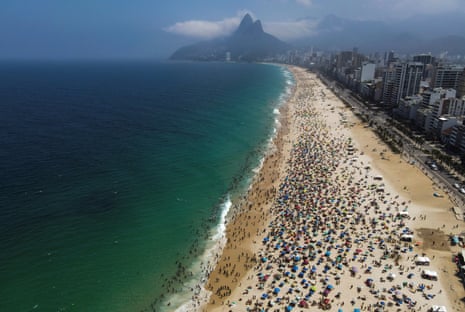
The British government’s plan to push people back into the office risks a return to “white middle-aged males” making important decisions in the office, while women and people from ethnic minorities are excluded at home, according to one of the UK’s most senior business leaders.
In an interview with the Guardian, Ann Francke, the Chief Executive of the Chartered Management Institute (CMI), warned that without careful oversight “blended working” could result in a two-tier system where women without sufficient childcare to return to the office are left out of key decisions.
Recent polling by the TUC revealed that two in five mothers do not have the childcare they need to return to the office as some nurseries, childminders and wraparound care remains unavailable, while research shows women are more likely to do the extra childcare.
My colleague Alexandra Topping reports.
World Health Organization reports record single-day rise in global infections
The World Health Organization (WHO) has reported a record single-day increase in global coronavirus cases on Sunday.
In the 24 hours to Sunday, a further 307,930 infections were reported globally.
Global officially recorded deaths from Covid-19 rose by 5,537 in the same period to a total of 917,417, the WHO website stated.
The biggest increases were from India, the United States and Brazil, according to the agency’s website.
India reported 94,372 new cases, followed by the United States with 45,523 new infections and Brazil with 43,718.
Both the US and India each reported over 1,000 new deaths and Brazil reported 874 lives lost in the past 24 hours.
The previous WHO record for new cases was 306,857 on 6 September.
On 17 April, the agency reported a record 12,430 deaths.
Spain plans to extend until the end of the year a measure preventing employers from using the coronavirus pandemic as an excuse to fire staff, a source with knowledge of the matter said on Sunday.
The government approved measures in March to prevent employers using Covid-19 as a reason to dismiss employees while the health crisis lasted.
Ministers are currently negotiating with unions and business groups to extend a furlough scheme, known as ERTE, beyond September when it was due to expire.
As part of these negotiations, the government is proposing to extend the ban on dismissing staff because of Covid-19 until the end of 2020, the source said, according to Reuters.
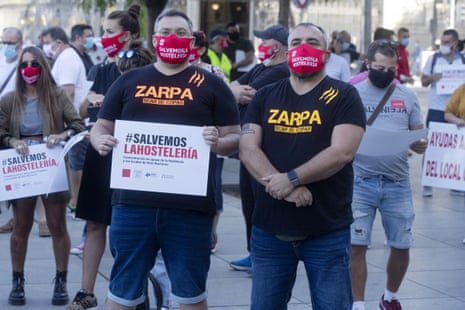
Currently, there are about 800,000 workers in Spain who are on the furlough scheme, compared to 2.5 million when the government declared a state of emergency in March.
Spain reported 4,708 new coronavirus infections in the last 24 hours on Friday, bringing its cumulative total to 566,326 – the highest in western Europe.
A government official declined to comment.
People in the Welsh city of Newport have been told to be “vigilant” for symptoms of Covid-19 and observe physical distancing following a local increase of cases.
Those who visited a number of bars and pubs in Newport were told to be particularly on the “lookout” for symptoms, as people had been at the premises during their infectious periods.
Public Health Wales reported “higher levels of transmission” of coronavirus in the Newport area, where there were 15 further cases on Sunday.
An investigation into the increase has been launched by Public Health Wales, Newport City Council and Aneurin Bevan University Health Board.
The cumulative number of cases in Newport over the past seven days has risen to 43.3 per 100,000 people – the fourth highest incidence in Wales, behind Caerphilly, Merthyr Tydfil and Rhondda Cynon Taf.
A local lockdown was enforced in Caerphilly county borough on Tuesday night, while measures were put in place in Merthyr Tydfil and Rhondda Cynon Taf on Thursday.
From Monday, people across Wales must wear face coverings in shops and indoor public spaces.
Indoor meetings of more than six people from an extended household will also become illegal.
Heather Lewis, consultant in public health at Public Health Wales, said: “We are grateful to the vast majority of residents in Newport for sticking to social distancing guidelines, and for co-operating with investigations into the spread of coronavirus in the area.
“Sadly, there is evidence that some people are ignoring social distancing guidelines, are failing to self-isolate when they have symptoms, and in a small number of cases are not being frank and honest with contact tracers about who they have met while infectious.
“Our message for the public is that coronavirus has not gone away, and it can be a very serious illness, especially for older and vulnerable people.”
Fearing one disaster will feed another, US relief groups are putting some people who fled their homes during West Coast wildfires into hotels to reduce the spread of coronavirus, stringing up shower curtains to separate people in group shelters and delivering box lunches instead of setting up buffets.
Large disaster response organisations like the American Red Cross are still operating some traditional shelters in gyms and churches, where they require masks, clean and disinfect often and try to keep evacuees at least 6 feet (2 metres) apart, the Associated Press reports.
The groups say they can reduce the risk of getting infected with coronavirus in a shelter but can’t keep people safe if they don’t evacuate from the flames.
“The last thing we want to have happen is people to remain in the path of a wildfire or hurricane because they think it’s safer to do that than risk a shelter,” said Brad Kieserman, vice president of disaster operations and logistics for the American Red Cross.
The fires in California, Oregon and Washington state have killed several people and sent 6,300 to emergency Red Cross shelters and hotels.

As many as 50,000 more could need shelters before the blazes are under control, Kieserman said.
Normally, they’d be gathering in school gymnasiums and meeting halls, sleeping on cots and eating at buffet lines provided by the Red Cross, Salvation Army and other faith and community groups.
But because coronavirus is easily spread in close quarters, gathering places are potential hotbeds of transmission.
That’s got disaster assistance groups taking a different approach.
The Red Cross screens evacuees and those who are sick or have symptoms are sent to special isolation shelters and kept away from one another.
When possible, displaced residents are sent to hotels instead of group shelters.
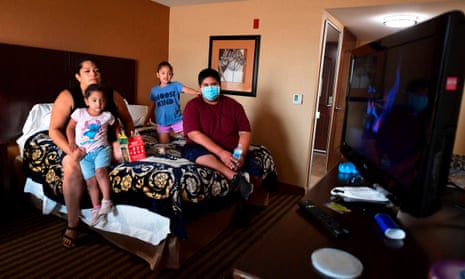
Instead of buffet lines, box lunches are delivered.
In central California, where thousands of residents had to flee the Creek Fire, more than 1,200 evacuees are staying at 30 hotels, said Tony Briggs with the Red Cross in Fresno.
In group shelters, staffers are using plastic pipes strung with clear shower curtains to separate evacuees but allow them to see out from their own physically distanced areas.
Israel’s new three-week nationwide lockdown will cost the economy 6.5 billion shekels (£1.46bn), the finance ministry said on Sunday.
During the lockdown, which starts Friday and comes during the Jewish high-holiday season, Israelis will have to stay within 500 metres of their houses, but can travel to workplaces that will be allowed to operate on a limited basis.
Schools and shopping malls will be closed but supermarkets and pharmacies will remain open.
The public sector will operate with fewer staff, but non-governmental offices and businesses will not have to close, as long as they do not accept customers.

“I know those measures will exact a heavy price on us all,” prime minister Benyamin Netanyahu said in a televised address.
“This is not the kind of holiday we are used to. And we certainly won’t be able to celebrate with our extended families.”
Netanyahu, who has faced increasing criticism over his handling of the coronavirus crisis, said he instructed his finance minister to come up with a new economic package to assist businesses hurt by the lockdown.
Johnson & Johnson’s Janssen unit will begin mid-stage trials of its Covid-19 vaccine in Spain on Monday, the programme’s lead investigator said.
Alberto Borobia said 190 people would take part in the country’s trials, which will take place in three hospitals and be concluded by 22 September.
The Spanish study is part of mid-stage, or Phase II, trials of the vaccine that are being carried out in three countries, also including the Netherlands and Germany.
The trials in the three countries will last two months and include 550 participants in total.
Saudi Arabia will partially lift its suspension of international flights as of 15 September to allow “exceptional categories” of citizens and residents to travel, the state news agency SPA said on Sunday.
The kingdom will scrap all travel restrictions on air, land and sea transport for citizens on 1 January 2021, it said.
In March, the kingdom suspended international flights to prevent the spread of the coronavirus.
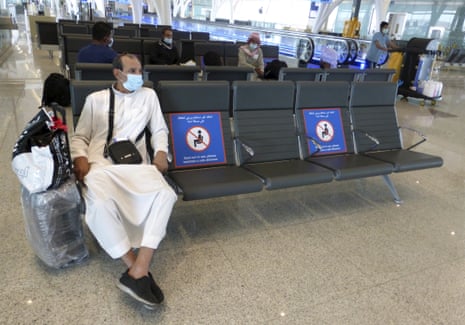
Exceptional categories include public and military sector employees, diplomats and their families, those working for public or non-profit private sector jobs abroad, businessmen, patients who need treatment abroad, those studying abroad as well as people with humanitarian cases, and sports teams, Reuters reports.
GCC citizens and non-Saudi residents with valid residency, or visitors’ visas will be allowed to enter the kingdom as of 15 September conditional on proving they have tested negative for coronavirus.
The kingdom introduced stringent measures to curb the spread of the virus in March, including 24-hour curfews on most towns and cities.
The kingdom has recorded 325,651 infections and 4,268 deaths.
Around 4,000 health workers demonstrated in Brussels on Sunday, calling for more spending on the healthcare system in a country that was badly hit by the coronavirus pandemic.
With political parties in Belgium still struggling to form a permanent government more than a year after a national election, the workers – who wore masks and carried banners with slogans such as “take care of the careworkers” – called on politicians to increase pay and healthcare funding.
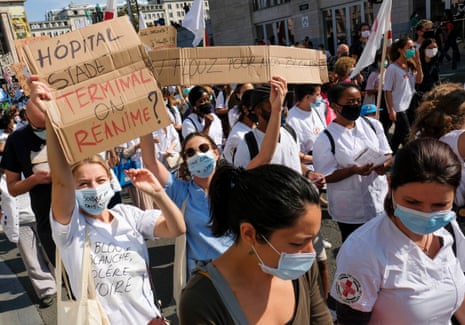
Police estimated around 4,000 people took part in the protest.
Belgium has reported 9,923 Covid-19 fatalities, which puts it the third-highest in the world for deaths per 100,000 people, behind the tiny city state of San Marino and Peru, Reuters reports.
The Belgian government has said the high rate is explained by its decision to include in its tally deaths where Covid-19 is only suspected, not confirmed.
France’s health authorities on Sunday reported 7,183 new confirmed coronavirus cases in the past 24 hours.
On Saturday, the number of new daily cases in France hit a record 10,561, with infection rates rising among all age groups.
In a daily website update, the French health ministry also reported the number of arrivals in hospital for Covid-19 over the past week had risen to 2,464 compared with 2,432 recorded on Saturday.
These included 427 admissions to intensive care units over the past seven days, up from 417 in Saturday’s count, it said.
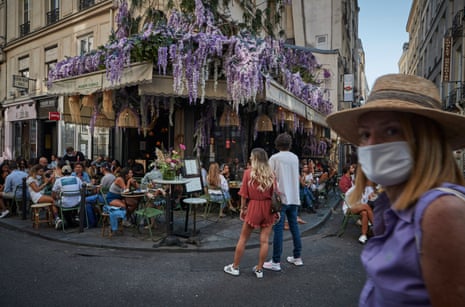
Like other European countries, France has faced a resurgence of coronavirus, leading the government on Friday to promise steps to speed up tests and toughen measures in high-infection zones to avert a return to the general lockdown imposed earlier this year.
The government has called on individuals to be more vigilant in private situations, and in an op-ed piece published in French newspaper JDD on Sunday six doctors called for people to avoid private gatherings.
The total death toll in French hospitals and nursing homes had reached 30,916, with six deaths recorded in the past 24 hours.
Israel to impose new three-week nationwide lockdown
Israel’s government has approved imposing a three-week nationwide lockdown to contain the spread of the coronavirus that will start on Friday, Israel’s Ynet news website and Channel 12 television reported on Sunday.
But Israel’s Ben Gurion airport will remain open, another TV channel reported, according to Reuters.
Israel’s increasing rate of coronavirus infection is bringing the country’s hospitals closer to maximum capacity and destabilising the health system, a report by Israel’s coronavirus information center said on Sunday, according to Haaretz.
The center’s daily report said that coronavirus is rapidly spreading in Israel, adding that the rate of infection during the past two weeks is the highest recorded since the outbreak began.
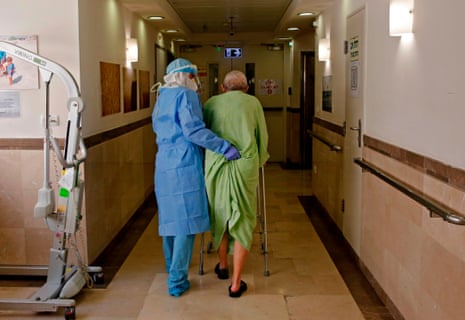
The Covid-19 death toll in Turkey reached 7,056 on Sunday, rising by 57 people in the last 24 hours, according to data from the health ministry.
The total number of cases in the country rose by 1,527 on Sunday, for a total of 291,162 cases, the data showed, with 258,833 people recovered from Covid-19.
Both daily deaths and cases have risen to mid-May levels in recent days.
The government has ruled out widespread lockdowns but has announced new measures recently, including banning weddings and other events and limiting the number of passengers allowed on public transport.
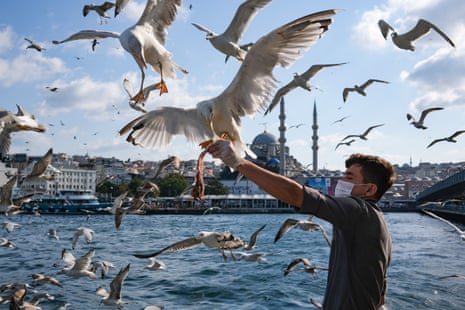
South Africa’s finance minister, Tito Mboweni, warned Sunday the economy could shrink by more than the 7% forecast by policymakers and the central bank for 2020, adding that public finances are “overstretched”.
The economy of Africa’s most industrialised nation contracted by more than half in the second quarter of this year, an unprecedented decline caused by coronavirus-related restrictions, AFP reports.
Looking ahead, there is a “risk that the actual GDP outcome for 2020 could be lower than previously thought,” Mboweni wrote in the local Sunday Times newspaper.
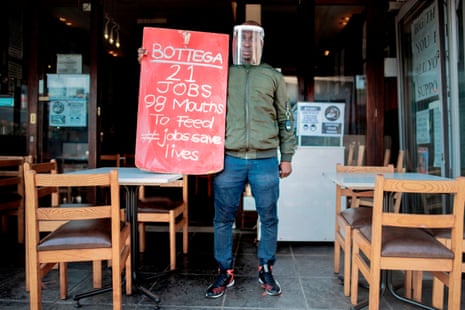
The treasury and central bank expect the economy to contract by 7.2% and 7.3% respectively this year, after the country went into a strict lockdown in March, already in recession.
Mboweni noted that public finances, already in an “unsustainable position” before the pandemic, were now “overstretched”.
“The reduction in economic activity in the second quarter has flowed through to lower tax revenue,” the minister wrote, adding that emergency tax relief to keep households and businesses afloat would compound the loss.
The government is expected to fall short of more than 300bn rand ($18bn) in tax revenue - over 6% of GDP - Mboweni said, forcing the heavily indebted country to “borrow even more”.
But he also promised reforms to climb out of the hole, writing: “[W]e must be bold in confronting what has impeded economic growth and the progress of our nation.”

He wrote that one of government’s priorities would be to ensure “adequate and reliable electricity”, backed by a commitment to unlock private investment in the public sector.
Unreliable electricity supply from state operator Eskom’s fleet of rickety coal-fired power stations is often blamed as a source of economic instability in South Africa.
The country accounts for around half of the continent’s coronavirus cases, with over 648,000 infections and 15,427 deaths recorded to date, although daily increases have been dropping since July.